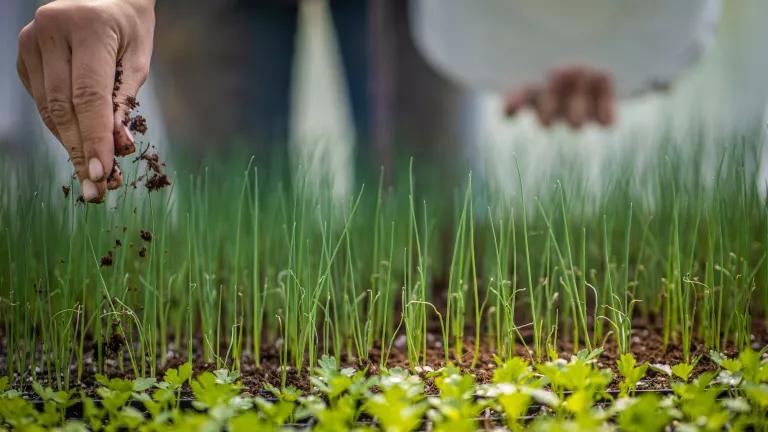New Survey: Young Farmers Lead on Climate but Need Support
The next Farm Bill should increase access to land and capital, spur climate action, and advance racial equity in agriculture.

Youth leadership has inspired climate action across sectors, and agriculture is no exception. A new National Survey of over 10,000 farmers by National Young Farmers Coalition shows that the vast majority of young farmers know our climate is changing and they farm to be part of the solution. But they urgently need federal policies that help them thrive.
83% of young farmers, 87% of BIPOC young farmers, and 88% of Black farmers say that one of their farm’s primary purposes is to engage in conservation or regeneration.
The Challenge?
Agricultural producers are struggling. Half of U.S. farms barely break even each year, and many shoulder significant debt. The burden of these financial pressures is heightened for Black, Indigenous, and other producers of color who have been systematically deprived of their land and who haven’t received a fair share of public investments in agriculture.

The National Survey identified numerous challenges facing young farmers, all of which are heightened for BIPOC farmers. In the last year, over a third of farmers surveyed – and more than half of BIPOC farmers – experienced challenges with access to land and capital. Many also struggled to find affordable housing and health care and manage student debt.

The Solution?
The next Farm Bill should increase access to land and capital, spur climate action, and advance racial equity in agriculture.
The Farm Bill directs billions of dollars to food and agriculture programs every year, but these investments are not adequately meeting the needs of many farmers or the urgency of our climate crisis. The National Survey found that 88% of farmers under 40 attribute changes in weather patterns to climate change and 73% of young farmers have experienced at least one climate impact on their farm in the past year. We do have existing federal programs that can help: numerous longstanding and oversubscribed conservation, research, and marketing programs offer funding and resources to support farmers as they shift toward climate-friendly farming and adopt best practices. But these programs are not reaching enough young farmers and BIPOC farmers.
For example, 97% of young farmers reported using sustainable practices and 86% described their farms as regenerative. But only 21% are certified organic and only 11% have participated in the Organic Certification Cost-Share Program that reimburses farmers for organic certification costs. It needs to be simpler and more fruitful for young farmers to access resources that support organic farming.

The National Survey found that over two-thirds of young farmers were not familiar with federal programs that support farmers; nearly 60% reported that they did not have time to apply and that the application and reporting requirements were too cumbersome. Most have never received outreach from USDA or community partners about federal farm programs. Worse, a quarter of young farmers who applied to federal programs were denied, which can have a chilling impact on participation. In addition, young BIPOC farmers reported more often that USDA staff ignored them or treated them in unwelcoming ways based on race.
In order to thrive and be part of the climate solution, farmers need stable land tenure and financial flexibility. Next year’s Farm Bill must reshape the agricultural policy landscape to center the people who feed us all.



